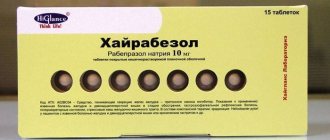Pharmacodynamics and pharmacokinetics
The mechanism of action of the drug has been partially studied; there are several hypotheses in this regard. Betahistine is a synthetic analogue of histamine , acts on H1 receptors , is an antagonist of H3 receptors , and exhibits insignificant activity towards histamine H2 receptors . The active substance improves blood circulation in the vessels of the inner ear by relaxing the sphincters in the microcirculation system of the inner ear . The drug can also increase blood flow in the basilar arteries .
Vestinorm tablets promote vestibular compensation, accelerate the process of restoration of vestibular function, by regulating metabolic processes in the release of histamine . The effectiveness of the drug has been proven in studies on patients with vestibular disorders and Meniere's disease. This group experienced a decrease in the frequency and severity of attacks.
After taking the tablets, the active substance is quickly absorbed into the gastrointestinal tract . Betahistine then metabolized to form the metabolite 2-pyridylacetonic acid . When taking the medicine with food, the plasma concentration of the metabolite is slightly lower than when taken on an empty stomach, and the absorption process from the gastrointestinal system slows down. The metabolite reaches its maximum concentration an hour after taking the drug. The half-life is 3 and a half hours. 2-pyridyl acetone acid is excreted mainly in the urine, a small amount is excreted in the feces and through the kidneys.
blood plasma proteins is very small - about 5%.
Pharmacological properties of the drug Vestinorm
betahistine (N-methyl-2-(pyridin-2-yl)ethanamide dihydrochloride) is a drug used for vestibular disorders (dizziness). A synthetic analogue of histamine, has a histamine-like effect. The drug is a partial agonist of histamine H1- and antagonist of H3-histamine receptors of the inner ear and vestibular nuclei of the central nervous system. Improves microcirculation and permeability of the capillaries of the inner ear, increases blood flow in the basilar arteries, normalizes endolymph pressure in the labyrinth and cochlea, transmitter transmission in the neurons of the medial nuclei of the vestibular nerve at the level of the pons of the brain stem. As a result, disorders of the vestibular apparatus and cochlear disorders are normalized, the frequency and intensity of dizziness is reduced, noise and ringing in the ears are reduced, and hearing improves. Improvement in the condition of acute vestibular disorders is noted already in the first days of treatment with the drug. A stable therapeutic effect is achieved within 2 weeks of taking the drug and can increase when taking the drug for several months. Being a blocker of H3 receptors in the nuclei of the vestibular nerve, it exhibits a pronounced central vasodilator effect. After oral administration, it is quickly and almost completely absorbed from the gastrointestinal tract. The maximum concentration in blood plasma is achieved 3 hours after administration. Protein binding is low. Passes through histohematic barriers. The half-life is 3–4 hours. Metabolized in the liver to 2-peridylacetic acid, which is almost completely excreted from the body in the urine within 24 hours.
Indications for use
Vestinorm is prescribed for illness and Meniere's syndrome , which are accompanied by dizziness, nausea, tinnitus, vomiting and hearing loss . Tablets are also used to eliminate the symptoms of vestibular dizziness in various diseases ( post-traumatic encephalopathy , dizziness after operations in ophthalmology and neurosurgery , vertebrobasilar insufficiency , vestibular neuritis , labyrinth , cerebral atherosclerosis
Side effects
Vestinorm is well tolerated by most patients; in some cases, side effects such as minor disorders of the gastrointestinal tract (nausea, feeling of heaviness in the epigastric region), and headaches may occur. The described manifestations in most cases go away on their own when Vestinorm is taken with food or when the dose is reduced.
In rare cases, the use of the drug may be accompanied by allergic reactions in the form of itching, urticaria, and skin rashes.
Side effects
As a rule, the drug is well tolerated. The most common symptoms are discomfort in the stomach, nausea, and headache.
There are also known cases of flatulence , bloating , allergic reactions , anaphylaxis , angioedema , rashes and itching
5, hives.
By taking the medication with food and reducing the daily dosage, some of the side effects go away.
Doctor's review
Alexander Pichugin Doctor of the highest category,
“Vestinorm is suitable for regular and seasonal use, eliminating not only the manifestations of allergic reactions, but also their root causes. Using the drug for the very first time allows you to eliminate tearfulness, swelling, symptoms accompanying a runny nose, stop skin itching, eliminate rashes, cough and shortness of breath. To protect yourself from allergic manifestations during the allergy season, you need to use this drug as a course. In addition, from the use of the product you can expect the restoration of metabolic reactions, cleansing the body of poisons and toxins, increasing immune resistance, improving well-being, and increasing performance. Passed clinical studies and has certificates of conformity.”
Vestinorm, instructions for use (method and dosage)
Tablets are prescribed orally for adults. It is best to take the medicine after meals without chewing the tablet.
The dosage and duration of therapy is determined by the attending physician, depending on the effectiveness of treatment and the individual characteristics of the patient.
It is best to prescribe the drug in the early stages of the disease to avoid its progression or decrease in the patient’s hearing acuity.
Instructions for use of Vestinorm
The daily dosage ranges from 24 to 48 mg.
Depending on the dose, the frequency of administration varies. For example, Vestinorm 24 mg is prescribed 1 tablet 2 times a day. Tablets with a dosage of 16 mg are taken 0.5-1 tablets 3 times a day. A medicine containing 8 mg of active substance is taken 1-2 tablets 3 times a day.
On average, the duration of treatment is several months. Sometimes improvements in the condition occur only after 14-21 days of daily pill taking.
No dosage adjustment is required for elderly people, people with liver and kidney diseases.
Content
- Characteristics of Vestinorm tablet, 16 mg n30
- Delivery vestinorm
- Doctor's review of Vestinorm
- Where can I buy ?
- How to make an order?
Vestinorm is a histaminergic drug primarily acting on the peripheral nervous system.
The active ingredient is betahistine dihydrochloride.
Has a vasodilating effect.
Indications.
Meniere's syndrome and disease, dizziness of various origins.
Application.
The instructions say that Vestinorm is taken during or after meals, three times a day at a dosage of 8-16 mg per dose.
Thus, for adult patients the daily dose is up to 48 mg.
In the future, the doctor can adjust the dosage based on data on the effectiveness of Vestinorm and the expected duration of therapy.
Contraindications.
Vestinorm is not prescribed for active forms of peptic ulcers, during exacerbation of bronchial asthma, for pheochromocytoma, or during pregnancy (there is not enough data on the safety of using the drug in pregnant women).
Vestinorm rarely causes side effects.
Sometimes minor disturbances in the functioning of the digestive tract and local allergic reactions are observed.
Special instructions.
Antihistamines reduce the effectiveness of Vestinorm.
When prescribed to patients suffering from bronchial asthma, constant medical supervision is required.
Caution is required when prescribing to patients with a history of peptic ulcers.
The drug does not have a sedative effect and can be prescribed to patients who work with potentially dangerous mechanisms and drive a car.
Analogs
Level 4 ATX code matches:
Betagis
Stugeron
Betaserk
Betaver
Westicap
Betagistine
Tagista
Vestibo
Cinnarizine
Aviomarin, Cinarizin, Vesticap, Cinnaridone, Stugeron, Tablets for motion sickness and nausea, Betaserc, Avetide, Akuver.
special instructions
Treatment of patients suffering from bronchial asthma should be carried out under constant medical supervision.
The administration of Vestinorm to persons with a history of peptic ulcer of the stomach or duodenum requires caution.
The drug does not have a sedative effect.
Impact on the ability to drive vehicles and complex mechanisms
Betahistine, according to clinical studies, does not significantly affect the ability to drive vehicles or operate complex machinery. But it should be taken into account that the speed of psychomotor reactions and concentration of attention can be negatively affected by hearing loss, dizziness, and tinnitus associated with Meniere's syndrome.
Reviews about Vestinorm
Reviews about the drug are good. It is often taken by patients with VSD to relieve unpleasant symptoms, dizziness and speech problems after traumatic brain injuries .
Reviews about Vestinorm:
“I have been familiar with such drugs for dizziness for a long time. I was prescribed Vestinorm at a dosage of 24 mg, once a day, for ten days, and then we’ll see about the condition, as the doctor told me. Around the fourth day, my condition improved noticeably. I don’t know, maybe I should have continued taking the drug, but I stopped taking it because it went away”;
“I have VSD + PA. Dizziness occurs very often, I read about Westinorm on the forum. I tried it and the dizziness became less frequent”;
"I am 50 years old. A diagnosis of vertebrobasilar insufficiency was made. I took Vestinorm for a month. I haven't drunk for 2 days. The dizziness does not go away completely, but has decreased. There are more head positions in which I don’t feel dizzy.”
Contraindications
Absolute:
- pheochromocytoma;
- children and adolescents up to 18 years of age;
- breastfeeding period;
- increased individual sensitivity to any of the components of the drug.
Relative (Vestinorm is taken with caution):
- bronchial asthma, including history;
- peptic ulcer of the stomach and duodenum, including a history;
- urticaria, rash or allergic rhinitis (due to the possibility of an increase in these symptoms);
- severe arterial hypotension;
- pregnancy period (only in cases of undoubted need and under close medical supervision).
Westinorm price
The cost of the drug is approximately 150 hryvnia for 60 tablets with a dosage of 24 mg.
- Online pharmacies in UkraineUkraine
Pharmacy24
- Vestinorm 24 mg N30 tablets PAT "Farmak", Ukraine
110 UAH. order - Vestinorm 24 mg N60 tablets PAT "Farmak", Ukraine
204 UAH order
- Vestinorm 16 mg N30 tablets PAT "Farmak", Ukraine
91 UAH order
- Vestinorm 16 mg N60 PAT "Farmak", Ukraine
165 UAH order
- Vestinorm 8 mg No. 30 tablets PAT "Farmak", Ukraine
68 UAH order
Overdose
Several cases of Westinorm overdose have been reported. In some cases, mild to moderate symptoms such as nausea, drowsiness and abdominal pain were observed at doses up to 640 mg, while in other cases vomiting, ataxia, dyspepsia and convulsions were noted. More serious symptoms in the form of seizures and complications from the heart and lungs were recorded with the deliberate use of increased doses of betahistine, especially simultaneously with an overdose of other drugs.
To treat the condition, it is recommended to perform gastric lavage within one hour after an overdose and, if necessary, prescribe further symptomatic treatment.
Price for Vestinorm in pharmacies
The price of Vestinorm is unknown because the drug is not commercially available.
The approximate cost of some of its analogues is:
- Betahistine: dosage 8 mg, 30 pcs. – 45–97 rub.; dosage 16 mg, 30 pcs. – 68–114 rubles; dosage 24 mg, 20 pcs. – 106–169 rubles; dosage 24 mg, 60 pcs. – 240–357 rub.;
- Betaserc: dosage 8 mg, 30 pcs. – 370–436 rubles; dosage 24 mg, 20 pcs. – 513–604 rubles; dosage 16 mg, 30 pcs. – 594–675 rub.; dosage 24 mg, 60 pcs. – 1130–1330 rub.
Use during pregnancy and lactation
The results of animal studies are insufficient to assess the direct or indirect effect of betahistine on the course of pregnancy, embryo formation, fetal development, labor and postnatal development of the child. Potential risk to humans is unknown. Due to insufficient data regarding the use of Vestinorm during pregnancy, tablets should not be prescribed to this category of patients, except in cases of undoubted necessity, after assessing the balance of benefits and risks.
It is not known whether betahistine passes into breast milk. Animal studies on its release during lactation have not been conducted. Vestinorm is contraindicated for use in breastfeeding women, or breastfeeding should be stopped during therapy.



